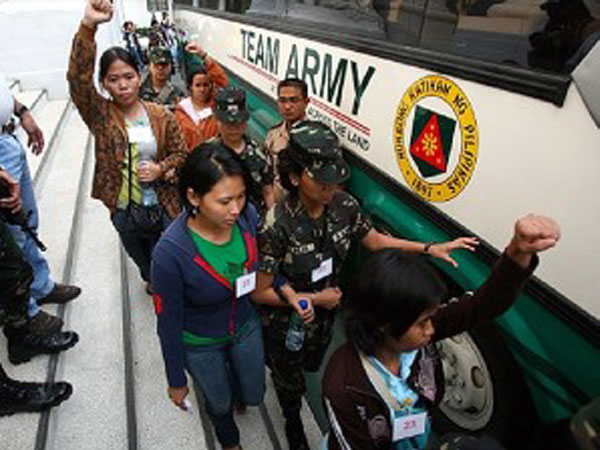
A file photo showing one of the 43 health workers arrested by the military in a raid in Morong, Rizal, thrusting a clenched fist as they are boarding their bus on their way to Camp Capinpin Detention facility in Tanay, Rizal. INQUIRER PHOTO
The Sandiganbayan will proceed with the trial of seven army and police officials who allegedly denied legal counsel to the so-called “Morong 43” health workers after their arrest in February 2010.
In a six-page minute resolution, the court’s Seventh Division denied the motion to quash filed by the defendants who questioned the validity of the charges over various technicalities.
The court scheduled on June 29 the arraignment of retired Lt. Gen. Jorge Segovia, retired Maj. Gen. Aurelio Baladad, Brig. Gen. Joselito Reyes, Col. Cristobal Zaragoza, Police Supt. Marion Balonglong, Police Supt. Allan Nobleza, and Police Chief Insp. Jovily Cabading.
The officials argued that the informations for eight counts of violation of Republic Act 7438, the law governing the rights of persons under detention or custodial investigation, were invalid for charging more than one offense.
They claimed they were charged with violating both Sections 4(a) and 4(b) of the said law. Section 4(a) penalizes the failure to inform the arrested person of his Miranda rights (the right to remain silent and have a competent lawyer). Section 4(b), meanwhile, prohibits officials from keeping the person from conferring with a lawyer, a relative, a doctor, or a spiritual adviser.
No duplicity of charges
The court, however, said it had effectively settled the matter when it issued a finding of probable cause on Jan. 10 for violation of Section 4(b) of the law. Ombudsman prosecutors also expressed their intention to amend the caption in the charge sheets to prevent further confusion.
The court also rejected the accused’s “hyperbolic depiction” of the date stated in the charges. The accused said the prosecution should have been more specific in providing the date because “February 7, 2010 or sometime prior or subsequent thereto” could encompass all dates “from the dawn of time to the present day.” The court clarified that this could only refer to nearby dates.
Probe not delayed
Lastly, the court disagreed with the defendants’ claim that unreasonable delays attended the Office of the Ombudsman’s preliminary investigation.
Siding with the prosecution, the court said the case moved continuously and only seemed to be idle from the submission of the last affidavit until the complaint was finally resolved.
Prosecutors had cited the “complexity” of the case and said the period of two years and five months was spent evaluating 10 counter-affidavits and the ensuing replies and rejoinders.
The court added that the defendants “have not shown how they suffered any more prejudice than is attributable to the nature of preliminary investigation.”
The case arose from the controversial arrest of the health workers whom the military claimed were communist cadres conducting explosives training in a house in Morong, Rizal province. The detainees went on hunger strike in protest of their alleged illegal detention, as they claimed to be tortured, threatened, deprived of sleep, and framed with planted evidence.
On Human Rights Day, Dec. 10, 2010, then-President Benigno Aquino III ordered the Department of Justice to drop what critics claimed to be trumped-up charges of breaking the firearms law. This paved the way for the detainees’ release. JE